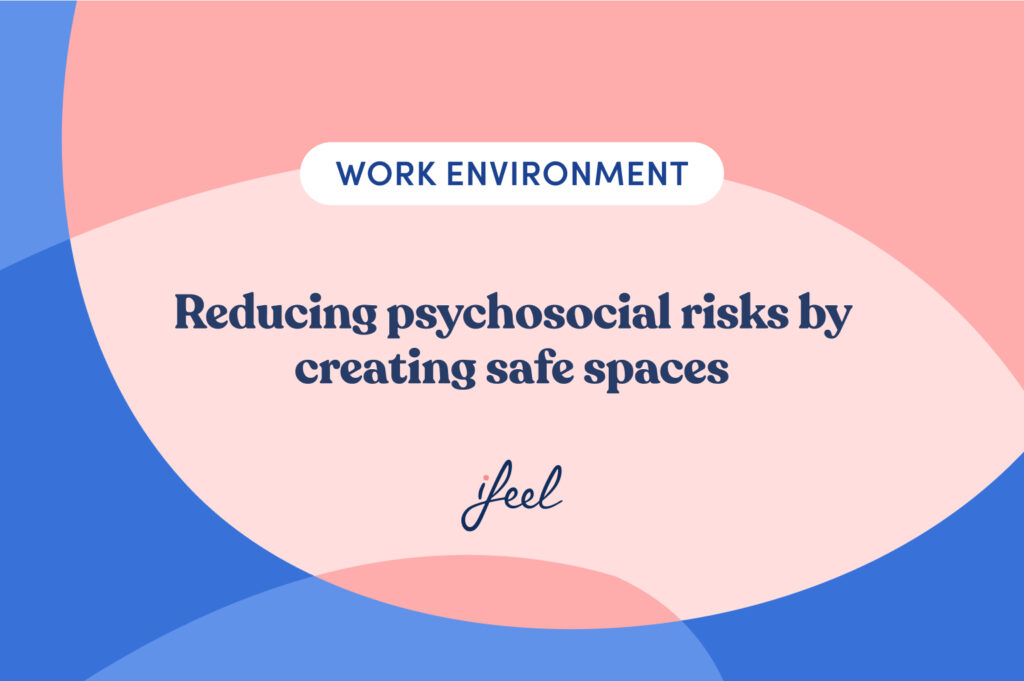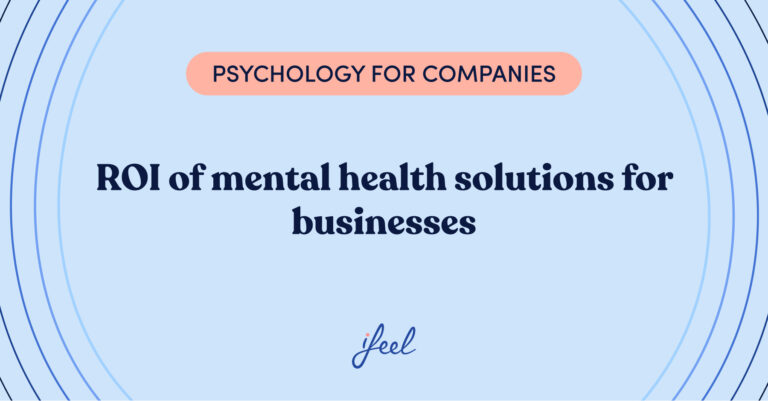Imagine a workplace where every voice is heard, every story is valued, and all individuals feel safe to be authentically themselves. In such an environment, workplace well-being is elevated, driving continuous improvement in organisational outcomes. The key is that it is precisely in our differences that companies can find the potential for true innovation and progress.
Diversity and inclusion are more than just slogans; they are the foundation for a robust and adaptable work culture. That is why cultivating an inclusive environment is not only desirable, but essential to business success and reducing psychosocial risks by creating safe spaces.
This article will guide you in creating a safe space that celebrates diversity and embraces inclusion. It also acts as a fortress against psychosocial risks, enhancing the well-being of all employees. Reducing psychosocial risks by creating safe spaces ensures employees feel protected and supported, which fosters trust and overall organisational health.
Download our Psychosocial Risk Factors template to prevent mental health problems at work. This template will help you identify and efficiently address these risks, promoting the well-being of your employees and your company’s productivity. Download the template now and improve your work environment!
What are psychosocial risks in the workplace?
Psychosocial risks refer to factors related to the design, organisation, and social environment of work that can negatively affect employees’ mental and physical health. These risks include work-related stress, harassment, excessive workload, and lack of social support.
Therefore, reducing psychosocial risks by creating safe spaces is essential because it affects not only the individual well-being and quality of life of workers but also directly influences organisational performance and productivity.
A work environment that minimises psychosocial risks promotes a culture of safety and health, which, in turn, leads to an increase in motivation and job satisfaction, and a decrease in absenteeism and staff turnover.
In this respect, diversity and inclusion play a key role in mitigating these risks. When an organisation promotes diversity and ensures inclusion, it creates a space where individual differences are accepted and valued. Such an environment reduces tensions arising from discrimination or lack of representation and fosters a culture of mutual respect and support.
The importance of diversity and inclusion
Diversity in the workplace refers to representing a wide range of employee characteristics, such as race, gender, age, sexual orientation, and more. Inclusion, on the other hand, is the process of ensuring that these diverse individuals are not only present, but also valued, respected and have equal access to opportunities.
Beyond respect and ethical values, diversity and inclusion strategies bring significant benefits for companies. In fact, studies show that companies with high ethnic and cultural diversity are 36% more likely to outperform their competitors in profitability. By integrating diverse experiences and backgrounds, approaches to problem solving are enriched, facilitating innovation and resulting in economic benefits for companies.
Let’s look at some of the benefits of inclusion in business:
| Benefit | Description |
|---|---|
| Promotion of innovation | An inclusive environment boosts creativity and the generation of new ideas, leading to innovative solutions. |
| Customer satisfaction | Diversity of perspectives contributes to a better understanding of customer needs, improving customer satisfaction. |
| Increased productivity | Inclusion creates a work environment where employees feel happy and more motivated, which increases productivity. |
| Mitigation of psychosocial risks | When people feel accepted and valued, they are less likely to suffer from work-related stress, thus reducing psychosocial risks. |
| Positive contribution to business goals | Employees who feel valued are more likely to contribute positively towards organisational goals. |
Reducing psychosocial risks by creating safe spaces
Reducing psychosocial risks is fundamental to ensuring the well-being and health of employees. And these risks, which include stress, harassment, and excessive workload, can be mitigated by creating a safe and welcoming workspace where psychological safety is a constant.
One of the most effective approaches to achieving this goal is to integrate diversity and inclusion into the work environment. This enriches the environment and promotes a culture of respect and innovation. Below is a breakdown of some strategies that can be implemented to reduce psychosocial risks by creating safe spaces.
1. Have a clear DEIB strategy in place .
Establishing policies that actively promote diversity and inclusion at all levels of the organisation, from the recruitment process to leadership promotion, is essential. This ensures that all employees feel represented and valued.
‘With the values of diversity and inclusion as our guides, we have been able to meet the challenges head on, meeting the needs of individuals and the wider community.’
Judith Palau, People Director at Mad Collective, an ifeel partner company.
2. Education and awareness raising
Implementing training programmes that make employees aware of the importance of diversity and how they can contribute to an inclusive environment is essential. Education in empathy and cultural awareness is key to reducing psychosocial risks by creating safe spaces, as it fosters a supportive and caring work environment.
3. Promote open communication
Honest and transparent communication is vital to creating a safe space. Employees should feel free to express their thoughts and concerns without fear of reprisal, which helps to identify and address problems before they become severe psychosocial risks.
4. Encourage employee resource groups
These groups offer a sense of community and support, allowing employees to share experiences and learn from each other. This not only strengthens relationships between colleagues, but also provides a space to address and mitigate psychosocial problems.
5. Recurrent practical exercises
Integrating practical activities, such as self-assessment questionnaires on psychosocial factors, effectively identifies areas for improvement within the organisation. These exercises allow you to adjust organisational strategies to create a more inclusive and safer working environment.
At ifeel, we have designed a Psychosocial Risk Factors template to help you prevent mental health problems at work. You will be able to identify and efficiently address these risks, promoting your employees’ well-being and your company’s productivity. Download the template now and improve your work environment!
Example of a practical exercise to promote inclusion in the work environment
Implementing practical exercises can effectively promote inclusion in the workplace, while assessing levels of psychological risk. Here is a sample activity:
Exercise: Personal Inclusion Assessment
Aim: To assess how each employee feels about the inclusion levels in their work environment.
Instructions: Distribute an anonymous questionnaire to assess employees’ perception of inclusion at work. Questions to consider:
- Do you feel valued by your colleagues and superiors?
- Do you have opportunities to express your views in meetings?
- On a scale of 1 to 5, how would you rate the inclusion policies in your team?
- Do you feel that your individual characteristics are seen as strengths?
Analysing results: Once you have all the responses from your team members, try to identify patterns in the responses, analysing the data to identify areas for improvement.
Develop action plans: Based on the results, work with the HR team to develop action plans that address common concerns. Leverage the strategies described above and adapt them to your organisation.

Trust the experts
At ifeel, we know that the path to reducing psychosocial risks by creating safe spaces requires a continuous effort that not only benefits employees, but also improves organisational performance. Fostering an environment where all employees feel valued and supported is essential for long-term success.
To facilitate this process, we encourage you to download our Psychosocial Risk Factors template to prevent mental health problems at work. You will be able to identify and efficiently address the relationship between psychosocial risks and mental health at work, promoting your employees’ well-being and your company’s productivity. Download the template now and improve your work environment!
To support companies in this process, our team of expert workplace well-being psychologists has created a mental well-being solution for businesses that improves talent retention, reduces presenteeism, and combats employee stress.
With our mental well-being solution, your company’s HR managers can receive personalised, data-driven advice on improving mental health at work. In addition, this solution offers employees a 360° mental well-being service structured at different levels according to their needs. Try our solution now to see how it could help you.
We hope you found this article on reducing psychosocial risks by creating safe spaces interesting. If you would like more information about our mental well-being solution for companies, simply request it, and we will contact your team as soon as possible.











